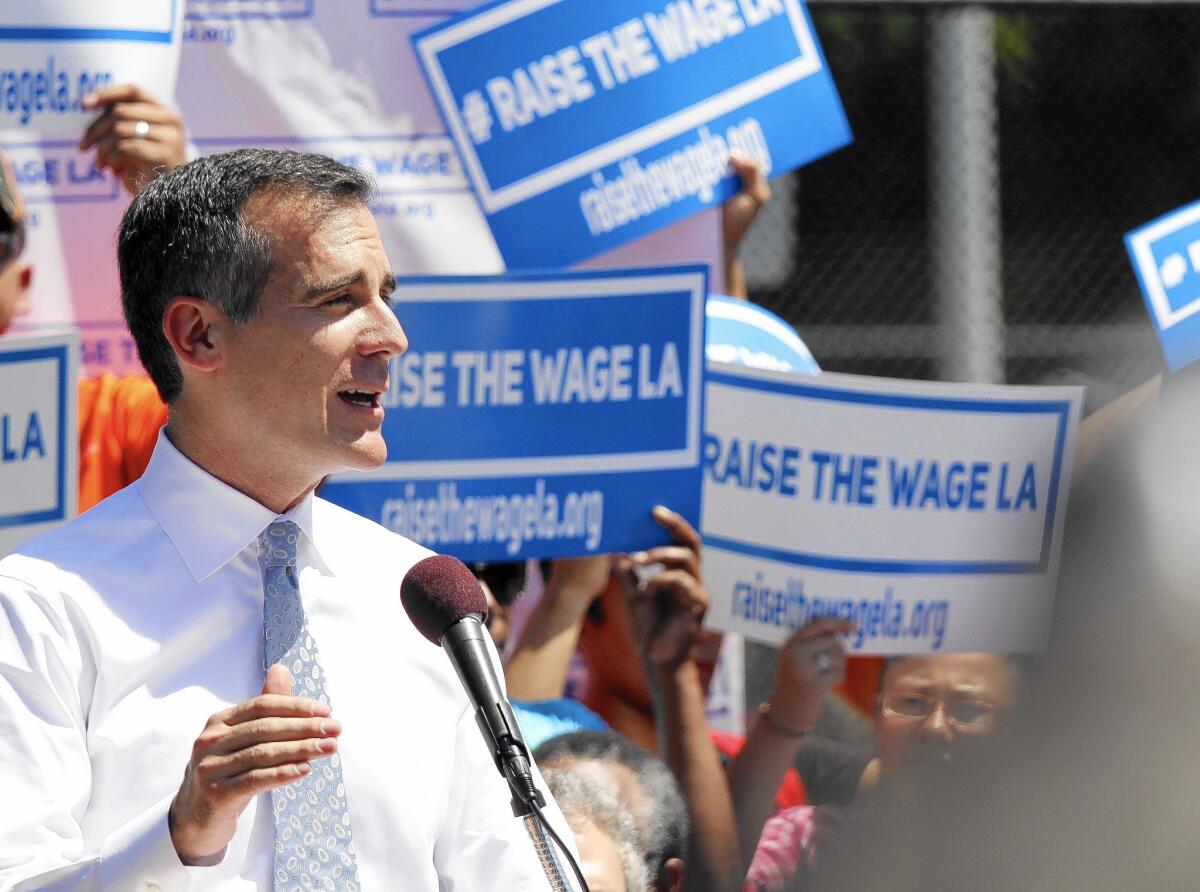Garcetti asking nearby cities to join L.A. in boosting minimum wages

When Los Angeles Mayor Eric Garcetti pitched his plan to gradually boost the minimum wage across the city, critics argued that businesses might move to nearby cities to pay workers less.
Now Garcetti is trying to persuade those neighboring cities to increase their minimum wages as well — and some are showing interest.
In Santa Monica, lawmakers have decided to analyze how a possible L.A. minimum wage hike would affect their city. If L.A. presses ahead, leaders of the coastal city will discuss whether to follow suit. In West Hollywood, council members voted last week to gather information about wages in their city, the first step toward deciding whether to impose a city minimum wage.
Garcetti’s proposal calls for increasing the minimum wage from the California state minimum of $9 an hour to at least $10.25 in 2015, $11.75 in 2016 and $13.25 in 2017. If neighboring cities join in, it could ease worries that L.A. may lose jobs. Garcetti promoted the plan Friday at a meeting with mayors representing cities from Lancaster to Long Beach.
“We are stronger as a region,” Garcetti told dozens of officials gathered at the Monterey Park library. “While we will always have some friendly rivalries, we should get past the days of, ‘Oh, don’t go to Long Beach, come to L.A.,’ or ‘Don’t go to L.A., go to Long Beach.’”
Culver City Mayor Meghan Sahli-Wells said she was interested in helping families handle steep rents in her city. Pasadena Mayor Bill Bogaard said the minimum wage was a logical topic for regional consideration and cooperation. And Santa Monica Mayor Pam O’Connor, who had met with Garcetti earlier in the week, said she thought it was the right thing to do.
“We know what the push-back is going to be” from businesses, said Bell Mayor Nestor Enrique Valencia, who said he personally backed the idea of boosting the minimum wage. “But the working-class people aren’t making it now.”
Leaders from several cities, including Glendale, Vernon and Long Beach, said they had yet to consider the idea. Huntington Park, a blue-collar city southeast of L.A., has focused on bolstering small businesses, not wages, in the wake of the recession, said public information officer Michael Chee.
And in the South Bay city of El Segundo, Mayor Suzanne Fuentes said she doubted a minimum-wage hike will get much traction with her city’s council members.
“The city of El Segundo is very business-friendly. That’s something we pride ourselves on,” Fuentes said. “I don’t want to tell a business what they have to pay an employee — the market will determine what the wages are.”
Business groups leery of the proposed boost say that if neighboring jurisdictions join Los Angeles, that could alleviate some of their concerns. But even if a number of Los Angeles County cities go along, “you still have the competitive disadvantage of L.A. versus Orange County or Ventura, or other cities in California,” said Carol Schatz, chief executive of the Central City Assn., which represents downtown businesses. “And there are many other concerns with this.”
Her group wants Garcetti to slow down the wage hikes, allow lower pay for teenage workers and count healthcare, pension and other benefits toward any minimum pay requirements. It also wants the city to lobby for changes in state law to permit tips to be counted toward minimum pay. Without such changes, the group argues, local businesses will struggle to cope with the increase.
The risk of job flight is a key point of contention. Many minimum wage jobs are in retail or fast food restaurants, which are more likely to choose their locations to draw customers than to find cheap labor, said Chris Tilly, director of the UCLA Institute for Research on Labor and Employment. A UC Berkeley study commissioned by Garcetti found that the proposed wage boost was unlikely to have a significant overall effect on employment.
However, the same study cautioned that some jobs in apparel manufacturing could relocate to nearby cities. The apparel industry has warned that a boost in the minimum wage would give factories in nearby cities an advantage over Los Angeles manufacturers, nudging them to move away.
“It’s 10 blocks to Vernon, another 10 blocks to El Monte, El Segundo, the City of Commerce,” said Ilse Metchek, president of the California Fashion Assn. “They could very easily move.”
That worry could influence other cities, particularly those that compete with Los Angeles for manufacturing jobs, as they weigh whether to follow Garcetti in boosting wages.
For Santa Monica “attracting apparel jobs is really not a consideration,” Tilly said. “For the City of Commerce, it might well be.”
emily.alpert@latimes.com
Twitter: @LATimesEmily
More to Read
Start your day right
Sign up for Essential California for news, features and recommendations from the L.A. Times and beyond in your inbox six days a week.
You may occasionally receive promotional content from the Los Angeles Times.







